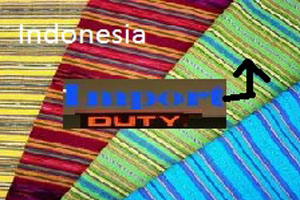
Indonesian to raise import tariff on finished goods covers textiles
YarnsandFibers News Bureau 2014-12-22 10:30:00 – JakartaThe Indonesian government to regularize its tariffs is evaluate the possibility of raising import duties on a wide range of finished goods. According to Industry Ministry’s director of Industry Climate and Quality Policy Research Center Haris Munandar, the potential hike will cover 741 out of over 10,000 existing tariff codes in the current customs system, cover textiles.
The step will support their goal to reach an ideal tariff system where [imported] finished products are charged with higher duties compared to raw materials or intermediate goods.
The system will provide the appropriate treatment for the upstream as well as the downstream industries, providing both sufficient room to grow.
Indonesia currently places a 6.8 percent import duty on foreign goods, lower than other emerging economies like China (9.6 percent), Brazil (13.7 percent) and India (13 percent).
It also imposes a 6.6 percent import duty on average for industrial goods, less than China (8.7 percent), Brazil (14.2 percent) and India (10.10) percent.
For emerging economies, the tariffs are usually of significant use, serving as a means to manage imports and provide room to expand particular industrial sectors.
Under the most favored nation rule, the World Trade Organization (WTO) allows its members to apply import duties of up to 40 percent.
The planned tariff increase would be within the range permitted by the global trade governing body.
Indonesian Institute of Sciences (LIPI) economist Latif Adam is of the view that the step taken by the government was a much-needed one to help the country improve the competitive edge of its domestic industry.
The relatively low import duties have given finished goods from overseas a better competitive edge in Indonesia. In fact, Indonesia still sees inefficiency as the country is still struggling with labor productivity and the use of technology in manufacturing.
This should have been done much earlier. But still it is a good move because in terms of tariffs they are more liberal compared to other developing nations. However, countries that do not have free trade agreements with Indonesia ought to be subjected to higher tariffs.
In addition to harmonizing the tariff system, the government is synchronizing its goods classification code under the ASEAN Harmonized Tariff Nomenclature (AHTN) in anticipation of establishing the single ASEAN market next year.
Market Intelligence
Ask for free sample Report

experience
Customer Base
dedicated team
Countries Served Worldwide









